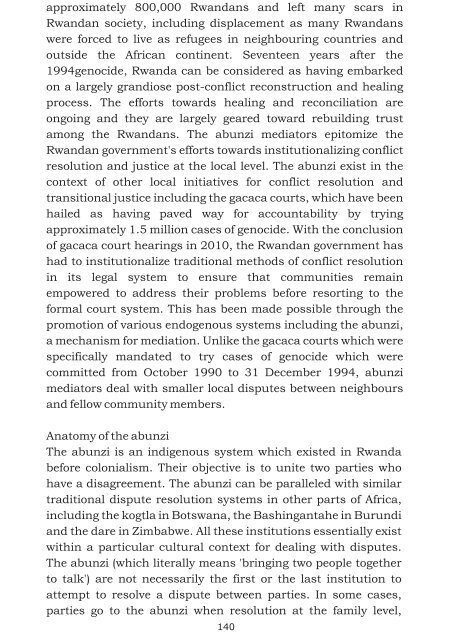Beneficiaries are actors too.pdf - Southern Institute of Peace ...
Beneficiaries are actors too.pdf - Southern Institute of Peace ...
Beneficiaries are actors too.pdf - Southern Institute of Peace ...
Create successful ePaper yourself
Turn your PDF publications into a flip-book with our unique Google optimized e-Paper software.
approximately 800,000 Rwandans and left many scars in<br />
Rwandan society, including displacement as many Rwandans<br />
were forced to live as refugees in neighbouring countries and<br />
outside the African continent. Seventeen years after the<br />
1994genocide, Rwanda can be considered as having embarked<br />
on a largely grandiose post-conflict reconstruction and healing<br />
process. The efforts towards healing and reconciliation <strong>are</strong><br />
ongoing and they <strong>are</strong> largely ge<strong>are</strong>d toward rebuilding trust<br />
among the Rwandans. The abunzi mediators epitomize the<br />
Rwandan government's efforts towards institutionalizing conflict<br />
resolution and justice at the local level. The abunzi exist in the<br />
context <strong>of</strong> other local initiatives for conflict resolution and<br />
transitional justice including the gacaca courts, which have been<br />
hailed as having paved way for accountability by trying<br />
approximately 1.5 million cases <strong>of</strong> genocide. With the conclusion<br />
<strong>of</strong> gacaca court hearings in 2010, the Rwandan government has<br />
had to institutionalize traditional methods <strong>of</strong> conflict resolution<br />
in its legal system to ensure that communities remain<br />
empowered to address their problems before resorting to the<br />
formal court system. This has been made possible through the<br />
promotion <strong>of</strong> various endogenous systems including the abunzi,<br />
a mechanism for mediation. Unlike the gacaca courts which were<br />
specifically mandated to try cases <strong>of</strong> genocide which were<br />
committed from October 1990 to 31 December 1994, abunzi<br />
mediators deal with smaller local disputes between neighbours<br />
and fellow community members.<br />
Anatomy <strong>of</strong> the abunzi<br />
The abunzi is an indigenous system which existed in Rwanda<br />
before colonialism. Their objective is to unite two parties who<br />
have a disagreement. The abunzi can be paralleled with similar<br />
traditional dispute resolution systems in other parts <strong>of</strong> Africa,<br />
including the kogtla in Botswana, the Bashingantahe in Burundi<br />
and the d<strong>are</strong> in Zimbabwe. All these institutions essentially exist<br />
within a particular cultural context for dealing with disputes.<br />
The abunzi (which literally means 'bringing two people together<br />
to talk') <strong>are</strong> not necessarily the first or the last institution to<br />
attempt to resolve a dispute between parties. In some cases,<br />
parties go to the abunzi when resolution at the family level,<br />
140


